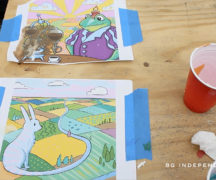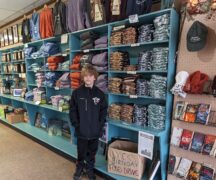By DAVID DUPONT
BG Independent News
Even though Irish piper Cillian Vallely has performed before audiences of thousands around the world, he’ll still find time after a gig to sit in at a local jam session, or seisiun.
The camaraderie of those spontaneous music gatherings have become a huge part of the propagating Irish music.
“You can go all over the world and go into an Irish bar and find people playing this music. There’s a common repertoire,” said Vallely, who grew up in Northern Ireland. “A lot people are not taking it up to be a performer or a top player, they take it up because they like the company.”
As a member of Lunasa, called “the hottest Irish acoustic group on the planet” by the Irish Times, he’s now at the pinnacle of Irish music, but he still likes to sit in.
Vallely, on pipes and low whistle, and Lunasa bandmate Kevin Crawford, flute and whistle, will play a free show Friday May 12 at 7 p.m. at Grounds for Thought, 174 S. Main St., Bowling Green. The concert, sponsored by local Irish group Toraigh an Sonas, is a preview for the full quintet’s performance at the Black Swamp Arts Festival on Sept. 8.
There was a time, Vallely said, when the music was dying out in Northern Ireland. Then in the 1960s folk revival brought it back to public attention.
His parents were catalysts in helping bring the music back. Though avocational musicians, they founded Armagh Pipers Club in 1966, taught and went on tour.
A few years later Cillian was born. “I grew up in this house full of instruments. Several days a week some kind of musical activity was going on.”
He started on the tin whistle, then graduated to the pipes. He tried the fiddle “but it felt alien to me.”
As a teenager he drifted away a bit. He was active in sports. He played flute in orchestra and saxophone in school combos. “But I always loved the music.” Still “it was down my list of priorities.”
It was in his late teens “when I started getting really addicted to it.”
“Once you get more into it, it’s amazing music. I just wanted to play it all the time,” he said.
While having a push from the family helped, in the end “you have to do it on your own.”
He has four siblings two of whom, Caoimhin and Niall, who joins him in Lunasa, became professional musicians.
In his 20s, he said, “I’d go out to bars play every night”
A bar would typically hire a couple more accomplished players to keep the session grounded.
These sessions, Vallely noted, are a fairly recent development. Typically before the 1950s, musicians would mostly play solo and for dancing.
Now he doesn’t get out as much with family and other responsibilities back home in New York.
But he expects to do some jamming during the current Midwest swing that will bring the duo to Bowling Green.
The music he and Crawford play as a duet is simpler than on their Lunasa gigs. Their sets are filled with traditional tunes, as well as contemporary tunes. Both of them also write original music for Lunasa.
What Vallely writes for the quintet “would be slightly more contemporary sounding and deliberately so,” he said. “When I write a tune, I’m not trying to recreate an old tune simply because there’s so many great old tunes. There’s no need. I try to write something that will work with the band.”
He said that he and Crawford will mix in a few Lunasa tunes into their Grounds set.
There is a distrust in some sectors of the community against new tunes. Some old musicians used to be cagey about the provenance of a tune they’d written, waiting until “it was accepted by the community” before they owned up to composing it.
But all tunes, Vallely said, were created by someone at some time. It’s impossible to draw a line and say no new music can be written after this time. “It’s just part of an evolving process.”





